In this week's case discussion from Dr Terry Harvey, this 20x17mm pigmented lesion is present on...
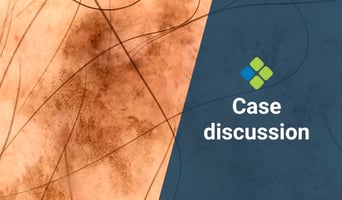
Manage complex cases through dermoscopy, advanced histopathology, topical treatments, and electro-surgery.
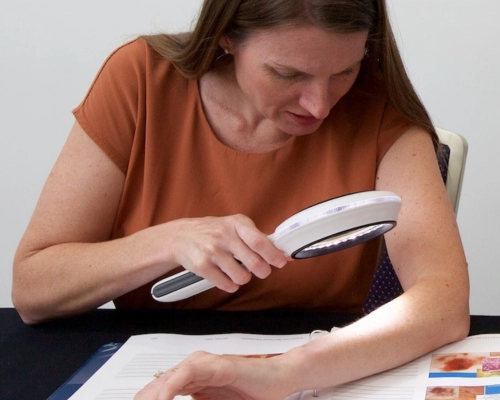
Extend your knowledge and learn how to manage rare and aggressive skin cancers and treat immune-suppressed patients.
- This course is perfect for advanced practitioners with prior training or experience in skin cancer medicine.
- Presented by the world's leading skin cancer experts including Professor Harald Kittler (Austria), Professor Richard Usatine (USA), Professor Iris Zalaudek (Austria), Professor Luc Thomas (France), Associate Professor Aimilios Lallas, and others.
- This course is for physicians, nurse practitioners, and degree-qualified nurses.
- CPD-accredited and university-assured.
- Learn about skin imaging, drug therapy, and studies of both melanoma and non-melanoma treatments.
- Improve your diagnostic accuracy through advanced dermatopathology.
- Learn about advanced preventive strategies like chemoprevention as proactive measures.
- Manage skin cancer with cryosurgery/electrosurgery techniques and personalise treatment plans.
- Get RPL with The University of Queensland or Torrens University.
This introduction lists the goals of dermatopathology and its relevance to clinicians. The dermatopathologist’s tasks and clinician’s role are outlined plus the steps of the pathology process once skin samples are received.
Different techniques of margin assessment are shown before moving on to analysis and comparison of margins and includes risk ratios and histological clearance of margins.
The relationship between surgical margins and recurrence rates is shown in a chart. The meaning of negative and positive histological margins is explained.
The module commences with the dermoscopy of solar (actinic) keratosis and squamous cell carcinoma. The reasons for treating solar keratosis are included depending on the history and lesion presence. A comparison is shown of lesion vs. field-directed treatments as well as a systematic review and meta-analysis, including suggestions for treatment. The liquid nitrogen cryotherapy technique, delivery methods and margin sizes are outlined including contra-indications and adverse effects.
The process of curettage with/without electrodessication is described, listing limitations and side effects. The use of topical 5-fluorouracil 5% cream is explained, looking at long-term management, limitations and complications. Clinical images and graphs reinforce learning.
The module looks at the progression of solar keratosis into invasive squamous cell carcinoma and the role of immunosuppression, illustrated by clinical examples. Field treatment options including modes of action and clinical examples of progression of treatment for each modality are provided.
Side effects and a table of expected local skin reactions is provided. The complexities when treating immunosuppressed patients are considered. The module concludes with a description of photodynamic therapy, including clinical examples.
The module begins with a description of special host and topography when applying skin cancer medicine to patients requiring special consideration, including patients having had organ transplants or suffering from HIV/aids. Another risk category are genetically predisposed patients who have an increased likelihood of developing a particular disease based on their genetic makeup.
A range of rare disorders/disease syndromes are discussed. Clinical images and research articles are included throughout the module. Several studies of melanoma patients are included. The module concludes with an overview of infrequently self-examined areas and featureless melanomas.
This module looks at chemoprevention, its application and how it works in the fight against skin cancer. Primary, secondary and tertiary chemoprevention treatments are listed including chemoprevention options for melanoma, keratinocytic skin cancer and other types of skin cancer and the role of sunscreens. Research articles, clinical and dermoscopic images and data supports the learning.
Different chemoprevention options including studies on other chemoprevention medications like statins and non-steroidal anti-inflammatory drugs are shown. The module continues with charts on the use of (systemic) retinoids, non-steroidal anti-inflammatory drugs and nicotinamide in skin cancer prevention.
Choice of treatment options include surgical excision and considers tumour characteristics, the patient and treatment modalities. The module then looks at management options and guidelines for superficial/pigmented/non-pigmented BCC. Surgical excision is not always the best treatment option and these situations are discussed and management plans outlined.
The module then looks at hedgehog pathway inhibitors for the treatment/prevention of advanced BCC. The management of keratinocyte skin cancer including clinical and dermoscopic grading and treatment options for solar keratosis are included. Invasive SCC including prognostic classification and characteristics/differentiation of keratocanthoma are included. The module concludes with lentigo maligna, one of the most difficult to recognise melanoma types.
This module describes cryosurgery and the mechanism of action, contra-indications, freezing methods, freeze time/thaw time plus variable factors that impact freeze time. Other considerations include halo diameter, patterns of freeze, type of BCC and number of freeze-thaw cycles.
The module continues to premalignant actinic cheilitis, including a table of freeze time/freeze-thaw cycles/halo diameter. Cryosurgery can be a treatment option for malignant BCC and SCC in situ. The technique, statistics and images of curettage and cryosurgery are shown. Possible complications are listed as well as several clinical examples.
The module then focusses on electrosurgery. Cautions/contraindications, recurrences and statistics are listed. Various clinical images of electrodessication and curettage reinforce learning.
This module reviews a collection of more aggressive primary cutaneous malignancies and outlines management options for these tumours. These tumours are hallmarks for adverse outcomes. Many of these entities are relatively rare however some of these more aggressive tumours feature higher rates of mortality and morbidity and clinicians need to be aware of their presentation features and behaviour.
The module lists the diagnostic entities and their specific symptoms, illustrated by various clinical images.
Skin imaging techniques for detecting melanoma and non-melanoma skin cancers are outlined starting with (digital) dermatoscopy, listing physical foundation, indications, evidence and target groups.
Total body photography is described and illustrated by images. A summary is given of indications, evidence and target groups. The module looks at reflectance confocal microscopy (RCM), explaining the concept of the method, in which cases it is used and clinical indications.
A chart is shown of possible combination of digital dermatoscopy with RCM. A summary is given of indications, evidence and target groups. The module then discusses optical coherence tomography, high frequency ultrasound, electric impedance spectroscopy, multispectral analysis and raman spectroscopy listing physical foundation, indications, evidence and target group.
The section provides further information on the management of metastatic melanoma. Evidence is given that BRAF mutations are the most common driver mutation in metastatic melanoma and treatment options for BRAF-V600 mutant MM are listed.
Results of studies in previously untreated patients with MM are given.. The effect of several drugs in patients with metastatic melanomas is shown and supported by charts.
If you're not interested in pursuing a full certificate in this field but simply want to enhance your skills in specific topics covered in this course, you can access the content of this and other courses for a flat fee of $83 per month (paid annually) within HealthCert 365.
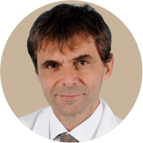
Professor at the Department of Dermatology, Medical University of Vienna, Austria
Professor Harald Kittler has a special clinical interest in dermoscopy of pigmented skin lesions. His main research interest is digital dermoscopy, follow-up of pigmented skin lesions, and computer assisted digital dermoscopy. Harald has been working for 10 years in the field of dermoscopy and has published a number of scientific articles especially in the field of digital dermoscopy and dermoscopic follow-up of melanocytic nevi.
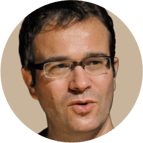
Professor and Chairman Department of Dermatology, Medical University of Lyon, France
Professor Luc Thomas was Board-certified in dermatology in 1989 at Lyon 1 University. He was trained as a post-doctoral fellow at Harvard Medical School in 1990 and 1991, and obtained his PhD degree at Lyon 1 University in 1993. He became full professor of dermatology in 1996, first class professor in dermatology in 2009, and Chairman of the Department of Dermatology of Lyon 1 University - Centre Hospitalier Lyon Sud in 2003. He obtained his Board certification in Clinical Oncology in 2013.
Luc’s main research fields include skin oncology, early diagnosis of melanoma, dermoscopy, skin surgery and nail diseases. He has published more than 400 peer-reviewed scientific articles in international journals, is the co-editor of four books published in several languages and co-author of more than 25 books. He has lectured at many international meetings, is an associate editor of Dermatology, a member of the board of the International Dermoscopy Society, a past member of the board and treasurer of the French Society of Dermatology from 2000 to 2003, and treasurer of the World Congress of Dermatology in Paris in 2002.

Professor Philipp Tschandl graduated from the Medical University of Vienna where he also obtained his PhD degree. His main research field is skin cancer, especially its early diagnosis through dermatoscopy, and the teaching of that method. He is an executive board member of the International Dermoscopy Society, secretary of the National Dermatopathology Society in Austria, and member of the Fostering Trainee Education Committee of the EADV.
Philipp is teaching dermatology in the core curricula of Human and Dental Medicine, lectures continuously on dermatoscopy at national and international meetings and workshops, and co-organised the 4th World Congress of Dermoscopy 2015 in Vienna. He has published more than 30 peer-reviewed scientific articles and is co-author of a major dermatoscopy textbook which has been translated into multiple languages.

Professor of Dermatology and Cutaneous Surgery at the University of Texas, USA
Founder and medical director of the University Health System Skin Clinic in San Antonio, USA
Professor Richard Usatine is the Professor of Dermatology and Cutaneous Surgery at the University of Texas. He is the author of nine books and over 120 papers, founder of the Interactive Dermatology Atlas on the web, and is the most recognised skin cancer presenter in the USA. Since 2000, he has been chosen yearly by his peers to be included in The Best Doctors in America. He is also the national chair of the yearly Skin Course put on by the American Academy of Family Physicians, and is the founder and medical director of the University Health System Skin Clinic in San Antonio.
Richard has been involved in Global Health through his work in Mexico, Guatemala, Panama, Haiti and Ethiopia. In 2000, Richard Usatine was recognised as the national recipient of the Humanism in Medicine Award, by the Association of American Medical Colleges.

Dermatologist-Venereologist, First Department Of Dermatology, Aristotle University, Greece
President, International Dermoscopy Society
Aimilios Lallas is an Associate Professor of Dermatology at the First Department of Dermatology of Aristotle University in Thessaloniki, Greece. He is specialised in skin cancer diagnosis with non-invasive techniques, as well as in the management of skin cancer patients.
His main field of research interest is dermoscopy of skin tumours, the application of the method in general dermatology and the improvement of the management of oncologic patients. He is an author of more than 330 scientific papers published on Pubmed Central, most of them on dermoscopy and skin cancer. He is an editor of eight books and author of several book chapters on dermoscopy. He is a co-investigator in several Phase III Clinical trials on skin cancer treatment. He has been awarded several scholarships and scientific awards.
Over the last years, A/Prof Lallas has established scientific collaboration with numerous colleagues from several countries and has supervised the training of numerous fellows from different countries. He is an invited speaker in several domestic and international congresses and meetings, mainly on dermoscopy and on skin cancer diagnosis and management. He is particularly involved in teaching activities on dermoscopy, having organised and participated in numerous domestic and international courses.
A/Prof Lallas is currently the President of the International Dermoscopy Society.

Associate Professor Skin Cancer Medicine, The University of NSW
Associate Professor John Pyne was conferred with a Master of Medicine at The University of Queensland, then held a position of Program Director for The University of Queensland Skin Cancer Masters from 2007 until 2013. The thesis for John’s PhD was on the correlations between dermatoscopy and histopathology for BCC and SCC. He is also a past President and Fellow of the Skin Cancer College of Australasia.
John has a main interest in the optical imaging of early primary non-lymphoid cutaneous malignancy and correlations with histopathology. He is currently investigating surgical margins in management of these cancers. John has teaching appointments at The Universities of Queensland, New South Wales and Western Sydney.

Head of the Dermatology Clinic of the University of Trieste, Italy
Associate Professor Iris Zalaudek is a board-certified dermatologist and Head of the Dermatology Clinic of the University of Trieste, Italy. Since 2016, she has been President of the International Dermoscopy Society, and was previously the Research Director of the Non-Melanoma Skin Cancer Unit at the Medical University of Graz, Austria.
Her main research fields are related to dermato-oncology and include non-invasive skin imaging techniques, as well as topical and systemic treatment of skin cancer. Moreover, she is engaged in the development of modern teaching methods such as online distant courses and tele-dermatologic services. She is Director of the Master of Science program entitled "Dermoscopy and Preventive Dermato-Oncology" of the Medical University of Graz, Austria.
Iris has published more than 450 articles, of which 358 (267 full papers) have been cited in PubMed. Her combined publications have received an impact factor of 1003 and a h-index value of 36 (by April 2017). In 2003 her work was awarded by the Hans-Weitgasser Price from the Styrian Association of Dermatologists and in 2008 she was awarded the Best Researcher of the Medical University of Graz, Austria.

Consultant Dermatologist at State Hospital for Skin and Venereal Diseases, Thessaloniki, Greece
Dr Zoe Apalla was board certified in dermatology in 2008 at the Aristotle University of Thessaloniki, Greece. She was trained in dermatopathology at the St John’s Institute of Dermatology in London in 2010 and obtained her PhD degree at the Aristotle University of Thessaloniki in 2013.
Zoe has worked as a consultant in the First Dermatology Department of the Aristotle University of Thessaloniki since 2010. She oversees the Supportive Oncology Outpatient Clinic and the Skin Cancer Outpatient Clinic, and the department’s dermatopathology laboratory. She also holds General Dermatology and Inflammatory Dermatoses Outpatient Clinics.
Zoe’s main research fields include skin oncology, melanoma and non-melanoma skin cancer, topical treatments, photodynamic therapy and dermatoscopy. She has published more than 100 peer-reviewed scientific articles in international journals and has lectured at many international and national congresses and meetings.

Dr Simon Clark runs the pathology component of the postgraduate certificate courses in skin cancer medicine at The University of Queensland and lectures in the Masters of Medicine course. He has been involved in dermatopathology education for more than 20 years, training registrars in dermatology, pathology and plastic surgery. More recently he has been active in GP education. One of the best known dermatopathologists in Australia, Simon was recently appointed a visiting professor in dermatology at the Tehran University of Medical Sciences.

Dr Elvira Moscarella is a dermatologist at the Santa Maria Nuova Hospital in Reggio Emilia, Italy. She acquired her medical degree in 2005 at the Second University of Naples before completing her residency in dermatology and venereology at the University’s Department of Dermatology. In 2008, Elvira undertook further education in dermoscopy and confocal microscopy. She is a member of the European Academy of Dermatology and Venereology and the International Dermoscopy Society, and is Editor in Chief of the latter’s newsletter and case of the month. Elvira’s main interests are in dermoscopy and reflectance confocal microscopy, and their use in skin cancer medicine.
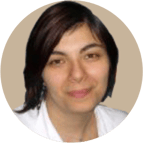
Second University of Naples, Italy
Dr Teresa Troiani is an oncologist committed to clinical and translational research. After completing her medical school studies, she was awarded a Fellowship in Oncology at the Università degli Studi di Napoli Federico II. Teresa has worked there since 1998, studying the role of growth factors and their receptors in neoplastic transformation and the novel therapeutic strategies targeting growth factor receptor signalling.
Teresa’s long-term interest is translational oncology, developing new therapeutic strategies and initiating clinical trials. She worked with Dr Gail Eckhardt for two years, publishing several papers in international journals. Teresa then returned to Naples. She has run a series of translational research projects, with both clinical and basic science investigational arms, at an academic medical centre. During her career, she has learnt that to fight cancer is a big challenge and only by connecting the preclinical with the clinical work is it possible to make one piece of the wider puzzle.

Study at your own pace and to your own schedule.

Easily meet your CPD requirements and gain valuable skills – all in one place for $83 per month.
from $1995
.
Bundle two courses and save 5%, or three courses and save 10% upon enrolment.
Talk to us about deferred payment options, registrar scholarships and special rates.
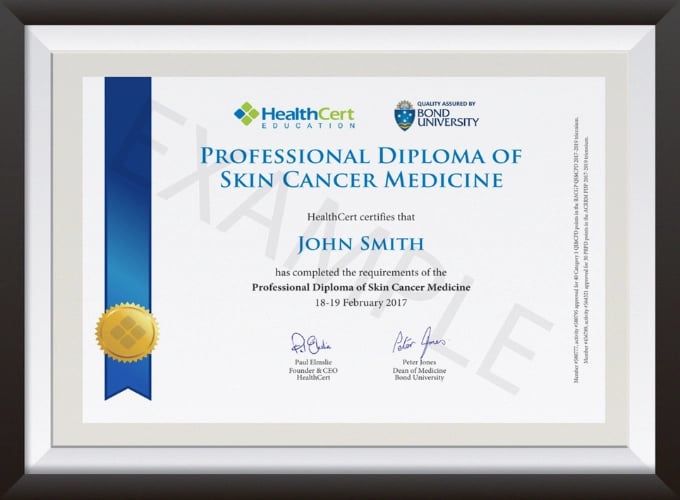

I appreciate the convenience of completing this course online at my own pace and in parallel with my day-to-day work.
Dr. I Aksenova
The Professional Diploma of Skin Cancer Medicine is an excellent course teaching essential knowledge. Highly appropriate for a busy primary skin cancer practitioner. Very relevant and practical material.
Dr C. Goonerage
The Professional Diploma of Skin Cancer Medicine gives a lot of confidence, knowledge and skills in dealing with skin cancers. I have enjoyed doing this course and I'm looking forward to doing the surgical component of the same.
Dr N. Anand
The Professional Diploma of Skin Cancer Medicine has increased my confidence in doing skin checks and treatments. The course was well organised with a fair work load. I was able to continue lectures at work if not busy. It has been a wonderful experience and I would like to try surgery next.
Dr T. Jameson
I am a better skin cancer doctor after doing this course.
Dr J. Mallen
| RACGP Activity Number | ACRRM Activity Number | Activity Title | Education Hours | Performance Hours | Outcome Hours | Total Hours | ||
|---|---|---|---|---|---|---|---|---|
| 407624 | 28102 | Merkel cell carcinoma and rare/aggressive melanoma and non-melanoma skin cancers | 407624 | 28102 | 4 | 6 | 0 | 10 |
| 407613 | 28100 | Factors influencing the choice of treatment in skin cancer medicine | 407613 | 28100 | 4.5 | 6 | 0 | 10.5 |
| 407605 | 28096 | Field treatments | 407605 | 28096 | 4 | 6 | 0 | 10 |
| 407600 | 28095 | Topical treatments and lesion-directed treatments | 407600 | 28095 | 4 | 6 | 0 | 10 |
| 407608 | 28099 | Chemoprevention in skin cancer medicine | 407608 | 28099 | 4 | 6 | 0 | 10 |
| 407607 | 28097 | Management of special cases including immuno-suppressed patients | 407607 | 28097 | 4.5 | 6 | 0 | 10.5 |
| 407627 | 28103 | Skin imaging techniques | 407627 | 28103 | 4.5 | 6 | 0 | 10.5 |
| 407618 | 28101 | Cryosurgery and electrosurgery in skin cancer medicine | 407618 | 28101 | 4.5 | 6 | 0 | 10.5 |
| 483137 | 31372 | Clinical Audit of Skin Cancer Medicine | 483137 | 31372 | 0 | 2 | 31 | 33 |
| Grand Total | 115 | |||||||
The Professional Diploma of Skin Cancer Medicine is ideal for medical professionals who wish to gain the optimum knowledge required to manage primary care patients with a multitude of skin cancer concerns, including rare and complex cases. Participants can expect to acquire advanced knowledge in dermoscopy, histopathology, topical treatments and electro-surgery, making you a favourable referral option for your colleagues. This online course is for physicians, nurse practitioners, and degree-qualified nurses aiming to deepen their focus in the field. Participants must have completed the Advanced Certificate of Skin Cancer Medicine (or a qualification deemed equivalent).
Participants do not have to pass an IELTS test but, as the courses are delivered in English, proficiency in listening, reading and writing English is assumed.
Participants will require access to a computer/laptop, an internet connection and a basic level of technology proficiency to access and navigate the online learning portal.
Professionally accredited qualifications and prior studies may be recognised for entry into this course. Please send an email to credit@healthcert.com for an individual assessment of your prior qualifications and experience. This email should contain information about your educational history and work experience that specifically pertain to the content and procedures covered in the Professional Certificate of Skin Cancer Medicine and Advanced Certificate of Skin Cancer Medicine. Please include any applicable certificates and course outlines from previous education. The relevant Course Chair will make a determination on your application within two to three weeks.
Doctors who have completed The University of Queensland certificate courses in skin cancer medicine and therapeutics will gain credit into the professional diploma program, providing the relevant HealthCert assessment has been completed.
Doctors who have completed the Certificate in Primary Care Dermatology with the RACGP (modules 1-5) may complete the relevant HealthCert assessment for the Advanced Certificate in Skin Cancer Medicine and then progress to the Professional Diploma of Skin Cancer Medicine (please ask a HealthCert Education Advisor for the process).
This certificate course meets the minimum 50 hours CPD annual requirement across all three mandatory CPD activity types.
Upon successful completion of the course requirements, course participants will receive the Professional Diploma
This certificate course:
Australia-based course participants, please note that HealthCert certificates are not accredited by TEQSA or ASQA and do not fall within the Australian Qualification Framework. All HealthCert certificates are professional development awards, accredited by RACGP, ACRRM and RNZCGP.
To learn more about the delivery of certificates in Australia and overseas, please visit our FAQs.
Professional Diploma Pathway
This course is the final stage of the three-part professional diploma pathway. The full pathway is Professional Certificate of Skin Cancer Medicine, Advanced Certificate of Skin Cancer Medicine and Professional Diploma of Skin Cancer Medicine.
RPL with The University of Queensland
Master of Medicine (Skin Cancer)
Doctors who complete the HealthCert Professional Diploma programs in Dermoscopy, Skin Cancer Medicine and Skin Cancer Surgery will receive RPL for the units IMED7002 and IMED7011, which are high-level subjects in the Master of Medicine (Skin Cancer) at The University of Queensland. The Master of Medicine is open only to registered medical practitioners with at least two years' postgraduate experience. IMED7002 is also a part of the Graduate Certificate Medicine (Skin Cancer); if a student (with two years' postgraduate clinical experience) who isn’t a registered medical practitioner has completed the HealthCert Dermoscopy pathway and the UQ units IMED7001, IMED7003 and IMED7010, they can receive the Graduate Certificate. View The University of Queensland, Master of Medicine (Skin Cancer) program.
RPL with Torrens University
This postgraduate pathway is for General Practitioners and degree-qualified medical practitioners who have successfully completed a HealthCert Professional Diploma (all three levels) in Skin Cancer Medicine, Skin Cancer Surgery or Dermoscopy. The following postgraduate course is offered entirely online through Torrens University: Master of Business Administration (MBA). Recognition of Prior Learning (RPL) is available for two general electives for any HealthCert Professional Diploma. In cases where a HealthCert alumni has completed two Professional Diplomas, they will be able to apply for four general electives towards the MBA. This will be helpful to further develop business, management and leadership capabilities. Please apply directly to Torrens University.
Postgraduate Diploma in Dermatology
The Postgraduate Diploma in Dermatology is studied through the Rila Institute of Health Sciences and awarded by the University of Plymouth (UK).
There are three modules in the Postgraduate Diploma. Medical professionals who successfully complete the HealthCert Professional Certificate of Skin Cancer Medicine, Advanced Certificate of Skin Cancer
The Postgraduate Diploma is mainly delivered online. No practical workshops will be required due to the APCL from the HealthCert qualifications. Overall there will be a time saving of 40 per cent of the postgraduate program due to the APCL. Exams will be held in Perth, Western Australia.
When the Postgraduate Diploma has been successfully completed, medical professionals can apply for credit from the Postgraduate Diploma to the Master of Science in the specialism awarded by the University of Plymouth.
Certified Clinical Attachments Pathway
Clinical attachments are optional and available on a 1:1 or small group basis. These provide the opportunity to observe skin cancer medicine treatments and ask questions of the expert performing the treatments. In addition to clinical attachments in Australia, university teaching hospitals at the University of Lyon and the University of Vienna are available for clinical attachments. HealthCert certificates and university statements are awarded for participating in clinical attachments.
The Medical University of Vienna is the largest medical organisation in Austria, as well as one of the top-level research institutions in Europe and provides Europe's largest hospital, the Vienna General Hospital, with all of its medical staff. The Vienna General Hospital has about 100,000 patients treated as inpatients and 605,000 treated as outpatients each year.
The dominant areas of study covered by The Université Claude Bernard Lyon 1 are science and medicine. Attached to the university are the "Hospices
This organisation is an RACGP-accredited CPD provider under the RACGP CPD Program.
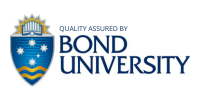

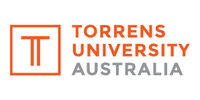
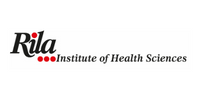
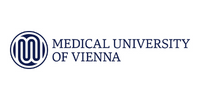
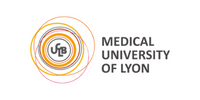


Don't see your question? Explore other faqs or talk to us.
Fees will vary based on the program and study option selected (fully online vs online + optional practical workshop). Payments can be made upfront or in monthly instalments. Special rates and various payment options are available. GP registrars and doctors in training enjoy a scholarship of up to $500. Talk to us to learn more.
Completion of any HealthCert course or attendance at an event will enable you to access the HealthCert Alumni Program which includes:
HealthCert Education is pleased to issue digital credentials for alumni. Digital credentials are a permanent online record of your successful completion of a HealthCert course and are issued to all course participants in addition to PDF certificates. If you are based in Australia, you also have the option to order a hard copy of your digital certificate for a small additional fee.
The recommended study duration of this certificate course is 82 hours, which includes study of the pre-course activities and readings, online lectures, live tutorials, and online assessment. This self-paced course offers the flexibility of 100% online study in your own time, at your own pace, in your own home or office, with no mandatory face-to-face requirements. You are not required to be online at specific times but can view and replay video lectures at your convenience.
All HealthCert courses meet World Federation of Medical Education standards. This certificate course qualifies for CPD hours from the Royal Australian College of General Practitioners (RACGP) and the Australian College of Rural and Remote Medicine (ACRRM) in Australia. It is recognised by the Royal New Zealand College of General Practitioners (RNZCGP) in New Zealand. It is recognised by the Hong Kong College of Family Physicians (HKCFP) in China. It is a self-submitted activity in Dubai and the United Kingdom. It is a self-submitted activity through the College of Family Physicians in Canada. If you live or work outside one of the above-mentioned countries, please contact us on admin@healthcert.com to discuss whether this course can be recognised in your country.
Want to stay up-to-date with the latest case studies, podcasts, free video tutorials and medical research articles pertinent to primary care?
Our Education Advisors can assist you with any queries and tailor our education pathway to suit your current expertise, interests and career goals.